Intro
Discover Dpt vaccine information, including benefits, side effects, and administration. Learn about diphtheria, pertussis, and tetanus prevention with this combined vaccine, and understand its importance for child and adult immunization schedules.
The DPT vaccine, also known as the diphtheria, pertussis, and tetanus vaccine, is a crucial immunization that protects against three serious bacterial infections. Diphtheria, pertussis, and tetanus are all highly contagious and can have severe consequences, especially for young children and individuals with weakened immune systems. Understanding the importance of the DPT vaccine and its role in preventing these diseases is essential for maintaining public health and safeguarding individual well-being.
The DPT vaccine has been widely used for decades and has undergone significant improvements to enhance its safety and efficacy. The vaccine works by introducing a small, harmless piece of the bacteria or a weakened form of the bacteria to the body, which triggers an immune response. This immune response helps the body to recognize and fight the bacteria if it encounters them in the future. The DPT vaccine is typically administered in a series of doses, with the first dose given to infants at 2 months of age, followed by additional doses at 4, 6, and 15-18 months of age, and a booster dose at 4-6 years of age.
The benefits of the DPT vaccine are numerous and well-documented. By preventing diphtheria, pertussis, and tetanus, the vaccine helps to reduce the risk of serious complications, such as respiratory failure, cardiac arrest, and even death. The vaccine also plays a critical role in preventing the spread of these diseases, which can have a significant impact on public health. For example, pertussis, also known as whooping cough, is a highly contagious disease that can spread quickly through communities, especially among young children. By vaccinating against pertussis, individuals can help to prevent outbreaks and protect vulnerable members of their community.
DPT Vaccine Benefits
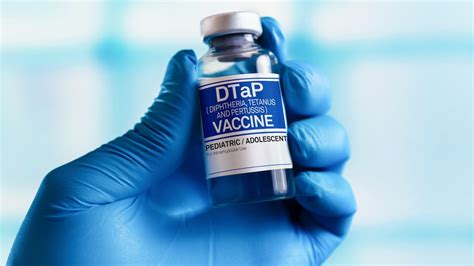
DPT Vaccine Working Mechanism
The DPT vaccine works by introducing a small, harmless piece of the bacteria or a weakened form of the bacteria to the body. This triggers an immune response, which helps the body to recognize and fight the bacteria if it encounters them in the future. The vaccine contains: * Diphtheria toxoid: a weakened form of the diphtheria toxin * Pertussis antigens: pieces of the pertussis bacteria * Tetanus toxoid: a weakened form of the tetanus toxin These components work together to provide long-term immunity against diphtheria, pertussis, and tetanus.DPT Vaccine Types
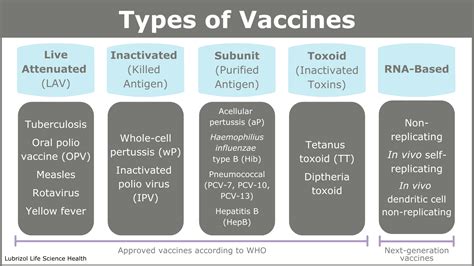
DPT Vaccine Administration
The DPT vaccine is typically administered in a series of doses, with the first dose given to infants at 2 months of age. The recommended schedule for DPT vaccination is: * 2 months: first dose * 4 months: second dose * 6 months: third dose * 15-18 months: fourth dose * 4-6 years: booster dose It is essential to follow the recommended schedule to ensure long-term immunity against diphtheria, pertussis, and tetanus.DPT Vaccine Side Effects
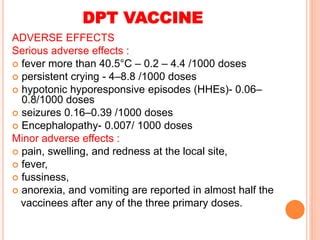
DPT Vaccine Contraindications
The DPT vaccine is contraindicated in certain individuals, including: * Those with a history of severe allergic reactions to the vaccine or its components * Those with a history of seizures or neurological disorders * Those with weakened immune systems, such as individuals with HIV/AIDS or cancer * Pregnant women, unless the benefits outweigh the risks It is essential to consult with a healthcare provider to determine whether the DPT vaccine is safe and suitable for a particular individual.DPT Vaccine Effectiveness
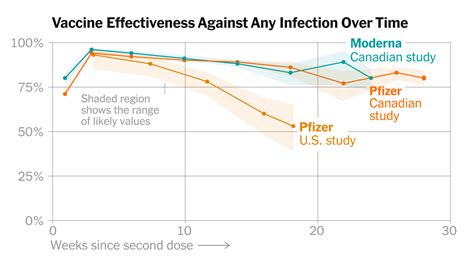
DPT Vaccine and Herd Immunity
The DPT vaccine plays a critical role in maintaining herd immunity, which helps to protect individuals who are not vaccinated or have weakened immune systems. By vaccinating against diphtheria, pertussis, and tetanus, individuals can help to prevent outbreaks and reduce the spread of these diseases. This is especially important for vulnerable members of the community, such as young children, older adults, and those with weakened immune systems.DPT Vaccine and Public Health
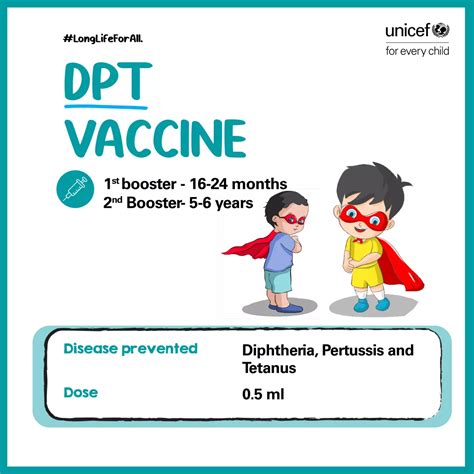
DPT Vaccine and Individual Health
The DPT vaccine also has a significant impact on individual health, as it helps to prevent serious complications and long-term health consequences. By getting vaccinated against diphtheria, pertussis, and tetanus, individuals can: * Reduce their risk of serious illness and hospitalization * Prevent long-term health consequences, such as brain damage or respiratory problems * Protect themselves and their loved ones from the spread of disease * Maintain their overall health and well-beingWhat is the DPT vaccine and how does it work?
+The DPT vaccine is a combination vaccine that protects against diphtheria, pertussis, and tetanus. It works by introducing a small, harmless piece of the bacteria or a weakened form of the bacteria to the body, which triggers an immune response.
What are the benefits of the DPT vaccine?
+The DPT vaccine offers several benefits, including protection against three serious bacterial infections, reduced risk of serious complications, and long-term immunity against diphtheria, pertussis, and tetanus.
What are the common side effects of the DPT vaccine?
+Common side effects of the DPT vaccine include redness and swelling at the injection site, fever, fussiness or irritability, loss of appetite, vomiting, and diarrhea. In rare cases, the vaccine can cause more serious side effects, such as allergic reactions or seizures.
How effective is the DPT vaccine in preventing diphtheria, pertussis, and tetanus?
+The DPT vaccine is highly effective in preventing diphtheria, pertussis, and tetanus. According to the CDC, the vaccine is 80-90% effective in preventing diphtheria, 70-90% effective in preventing pertussis, and 90% effective in preventing tetanus.
Why is it important to maintain high vaccination rates against diphtheria, pertussis, and tetanus?
+Maintaining high vaccination rates against diphtheria, pertussis, and tetanus is crucial for preventing outbreaks and reducing the spread of these diseases. By getting vaccinated, individuals can help to protect themselves, their loved ones, and their communities from the spread of disease.
We hope this article has provided you with a comprehensive understanding of the DPT vaccine and its importance in preventing diphtheria, pertussis, and tetanus. If you have any further questions or concerns, please do not hesitate to reach out to your healthcare provider or comment below. Share this article with your friends and family to help spread awareness about the importance of vaccination and public health. Together, we can work towards a healthier and safer community for everyone.
